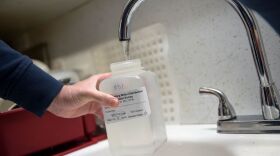When you call the city of Melvindale’s Department of Water and Public Works these days, you’ll hear a message that goes like this:
“If you’re calling regarding recent lead sampling results for the city of Melvindale, please note that the water supply we are provided from Great Lakes Water [Authority] is safe. This applies to properties that have lead service lines going into their home.”
Want to support more reporting like this? Consider making a gift to Michigan Radio today.
The message is there because this week, the Michigan Department of Environment, Great Lakes and Energy released recent results of water sampled from 30 Melvindale homes. Nine of those sites were above the federal action level for lead in water—15 parts per billion (ppb). Melvindale’s 90th-percentile result (meaning 10% of homes sampled higher): 370 ppb.
While Flint became infamous for its lead-in-water crisis, recent testing showed that city’s 90th-percentile for lead at six ppb. But a higher number of other Michigan communities are coming back with results that exceed the federal action level—largely because of new, stricter state requirements for how cities test for lead.
Melvindale has the highest result so far, but 13 other cities have returned results higher than the action level in this latest round of testing. They include Highland Park, Dearborn Heights, Oak Park, Birmingham, Benton Harbor, Clare, and Hazel Park.
Michigan’s new Lead and Copper Rule, adopted in 2018, requires that cities take and test more water samples—and sample more high-risk homes with lead service lines. That methodology is already “bearing fruit,” according to EGLE spokesman Scott Dean.
“By getting this data to know when these lead service lines are negatively impacting people’s drinking water, it’s helping municipalities target them for replacement,” Dean said.
The new LCR requires that municipalities replace all lead service lines by 2040. An initial inventory of those lines is due Jan. 1, 2020, Dean said. He said EGLE is also working with water suppliers, such as southeast Michigan’s Great Lakes Water Authority, on corrosion control measures that can prevent lead from leaching into water in the first place.
Dean says 500 communities tested their water under the new LCR rules in the latest round of testing, and results are still coming in: “There’s a large tranche of data that we’re processing right now.”
Elin Betanzo, a water safety engineer formerly with the U.S. Environmental Protection Agency, says the increased testing does a better job of reflecting water that’s sitting in lead service lines, rather than just household plumbing.
“We’re collecting new data, and more comprehensive data that does a better job of reflecting the type of water that people might be drinking in their homes,” Betanzo said. “We can see that there is lead in the water in these higher-risk conditions. And that means that we have to take precautions.”
If found in violation of the LCR, cities are required to notify residents, do more comprehensive and frequent testing, and if they can’t bring the city under the federal action level, replace lead service lines at a rate of 7% per year, rather than the baseline 5% required by the new state law.
But Betanzo says the most important steps are the ones people can take to protect themselves in their own homes—such as getting water filters certified for filtering out lead, and cleaning out aerators on faucet heads where lead particles can get stuck.
Betanzo says the more well-informed people are about the true risk of lead contamination, the better. “This is information that we just didn’t have before,” she said. “And now we’re doing a much better job of communicating that risk to people.”







